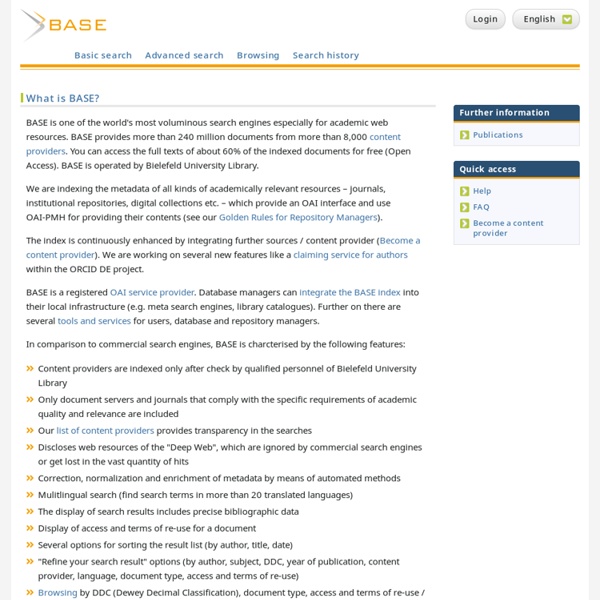ORCID | Connecting Research and Researchers
101 Free Online Journal and Research Databases for Academics | Scribendi
Introduction Has this ever happened to you? While researching an important paper, you come across an online journal database that claims to connect academics to high-quality peer-reviewed research. Intrigued, you search for keywords related to your topic, only to discover that you must pay a hefty subscription fee to access the service. Subscription fees and paywalls are often the bane of students and academics, especially those at small institutions who don't have access to many article directories and repositories. Whether you're working on an undergraduate paper, a PhD dissertation, or a medical research study, we want to help you find tools to locate and access the information you need to produce well-researched, compelling, and innovative writing. Check out the top 21 free online journal and research databases in this article, and click the link below to download the full list of 101 databases, completely free! The Top 21 Free Online Journal and Research Databases 2. 3. 4. 6. 7. 8. 9.
Paperity - Multidisciplinary aggregator of Open Access journals & papers | Paperity
Open Access Journals Search Engine (OAJSE)
*Google Scholar: Library Partner or Database Competitor?
By Nancy K. Herther Information professionals rely on vetted sources of information in order to provide the best quality service to their clients—whether they are students, researchers, or businesses. The internet has profoundly transformed our communication expectations, access to information, product evaluation, and buying behaviors. It has disrupted the business models of retail stores, the travel industry, and music. For libraries, it has created serious challenges in the provision of quality information services. What is the role of Google Scholar (GS) in libraries today? GS has not only become a common fixture in library literature but is also becoming ubiquitous in information-seeking behavior of users. Since 2009, the reliance on Google products has risen dramatically in academic and research institutions as financial and public support have declined. However, Smit sees a clear, ongoing need for quality scholarly databases with sophisticated search options.
Open access journals | Open Science
Acta Orthopaedica et Traumatologica TurcicaActa Orthopaedica et Traumatologica Turcica (AOTT) publishes diagnostic, treatment, and prevention methods related to orthopedics and traumatology and original studies in related disciplines. Contributions may be in the form of clinical and basic… Acta Pharmaceutica Sinica BActa Pharmaceutica Sinica B (APSB) is a bimonthly journal, in English, which publishes significant original research articles, rapid communications and high quality reviews of recent advances in all areas of pharmaceutical sciences — including… Addictive Behaviors ReportsAddictive Behaviors Reports is an open-access and peer reviewed online-only journal offering an interdisciplinary forum for the publication of research in addictive behaviors. The journal accepts submissions that are scientifically sound on all forms of… AmpersandServing the breadth of the general and applied linguistics communities, Ampersand offers a highly-visible, open-access home for authors.
Search Contents of Open Access Repositories
Search Repository Contents This service, based on the Google Custom Search engine, lets you search the contents of the repositories listed in OpenDOAR for freely available academic research information. This quality assured approach minimises (but does not eliminate!) spurious or junk results, and leads more directly to useful and relevant information. Full texts are available for most results. This service relies on Google's indexes, which in turn rely on repositories being suitably structured and configured for the Googlebot web crawler.
Rutgers University Begins Implementation of ORCID iDs | Rutgers University Libraries
Today, Rutgers University begins a formal universitywide implementation of Open Researcher & Contributor IDs (ORCID iDs). An ORCID iD is a persistent digital numeric identifier that distinguishes a researcher from every other researcher. It remains constant through changes in name or institutional affiliation, ensuring that a person’s work is properly attributed and recognized throughout their career. To date, nearly 4 million ORCID iDs have been issued to researchers around the world, including hundreds of affiliates at Rutgers. Essentially, ORCID acts as a clearinghouse where researchers can compile and curate a record of their scholarly activity, including elements such as their funding history, affiliations, presentations, and published works. “In today’s information landscape, it is vital that researchers disambiguate themselves from others,” said Krisellen Maloney, vice president for information services and university librarian. “The idea is very simple,” added Copeland.
Encyclopedia Britannica
List of academic databases and search engines - Wikipedia
From Wikipedia, the free encyclopedia This article contains a representative list of notable databases and search engines useful in an academic setting for finding and accessing articles in academic journals, institutional repositories, archives, or other collections of scientific and other articles. Databases and search engines differ substantially in terms of coverage and retrieval qualities.[1] Users need to account for qualities and limitations of databases and search engines, especially those searching systematically for records such as in systematic reviews or meta-analyses.[2] As the distinction between a database and a search engine is unclear for these complex document retrieval systems, see: the general list of search engines for all-purpose search engines that can be used for academic purposesthe article about bibliographic databases for information about databases giving bibliographic information about finding books and journal articles. Operating services[edit] [edit] [edit]



